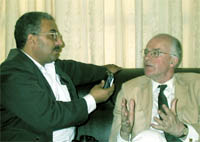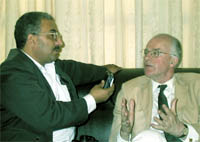
A Yemen Times exclusive: Sir Cyril Townsends thoughts on Yemen and other issues in the Arab World [Archives:2002/12/Reportage]
March 18 2002

The council was set up in Britain 1967 to improve understanding of the Arab World as build links between the UK and Arab countries.
Mohammed Bin Sallam of the Yemen Times met with him at the Sana’a International Airport. Following is an edited copy of their conversation.
Q: What is the CAABU?
A: We have nearly 1,000 paid members and are led by two co-chairmen who are both members of parliament, plus myself, a parliamentarian for 23 years. On our executive committee of 15 people, there are five Arabs.
When we had set up the organization in 1967, it was a British organization dealing with the Arab World. Today, it is a British-Arab organization dealing with Arab World. The Arab community in the UK now has nearly a half million people. As you know, the oldest part of that community is the Yemeni community, based in Birmingham and Cardiff.
We encourage the Arab community to get involved with British politics and are very busy in parliament. We deal with the House of Commons and with the House of Lords.
We visit 50 schools every year to talk about the Arab issues. Weve been asked, for example, why Arabs are interested in Jerusalem, when it is going to be the Israelis capital? So we need to send experts to explain things like the importance of the UN resolution 242, and how the world community thinks that Israeli should withdraw from the occupied territories. We try to explain the culture of the region.
There was an opinion poll a few weeks ago that suggested 80% of the population in the UK thought that Islam is a part of the international terrorist problem. That is an astonishing statement. Islam has nothing to do with terrorist acts.
Q: Since the establishment of the council in 1967, what is the role of the CAABU concerning Yemen?
A: We have taken a particular interest in Yemen for historical reasons. A staff of ours, Moira Howard, is now writing pamphlets about Yemen, including the role of women in the Yemeni Society. Mr. Braid Shaw who is our new minister responsible for the Middle East, has not yet been to Yemen, but I expect I will be asking him to come to this country.
Q: What are your impressions about Yemen?
A: I’m worried about the water problem, which is more serious that I first realized. With such a large growth in population, the amount of water that is given to Qat is a serious problem. We are told that at its present rate of water use, Sana’a will run out of water in as little as 15 years. This is a serious issue. I don’t know many countries where the capital is living with such a water crisis.
Q: What are the main results of your visit to Yemen?
A: I’ve been lucky enough to visit most of the Arab countries. I have been in the UAE recently, and previously I was in Libya and in Sudan. But I think this is a particular interesting moment to visit Yemen. I’ve been struck by its population increase. Yemen, of course, has the largest population on the peninsula.
I’ve been deeply impressed with the way you have improved your relations with neighboring countries for example, the Kingdom of Saudi Arabia. Border issues have been settled, which is a very positive step in relations between Saudi Arabia and Yemen. I am aware of initiatives taken by Yemen and Eritrea in which Yemen showed a very sensible interest in the international arbitration and I think this is also a good example of international behavior.
Im also happy that you are now represented on some of the committees of the GCC countries. I would be happy for Yemen to join the Commonwealth and I will be watching with interest to see if you join the GCC.
Q: With whom did you meet while on your visit here?
A: I had the privilege to meet al-Eriani, the former Prime Minister and the Minister of Communication. In Aden, we saw the governor and the vice-governor. We were also shown around the new port. We also met our friends in the British-Yemeni Society. I discussed with them what they are doing in Yemen.
Q: Has Yemen supported your council?
A: I was delighted that Yemen has given financial support to the CAABU. Yemen has shown a wonderful example. Its given money on annual basis to my council in London.
Q: What are some significant places youve seen in Yemen?
A: Weve seen the capital. Then, we went to Taiz where we toured a large commercial biscuit factory. While we were in Aden, we were shown the port, and I was impressed with the growth of the free zone where there are 500,000 containers coming to shore. We were told that the majority of the containers are sent to other parts of the region. This is a great international port.
Q: What is the CAABU’s role with regard to the current development in the occupied territories and Iraq’s position of terrorism?
A: We spend 40% of our time on the Palestinian issue. We are deeply shocked of what is happening now, with the terrible death-toll in Palestine, even now while I’ve been here in Yemen. We are all aware of Britain’s traditional responsibilities to Palestine. We spend another 20% of our time on Iraq. We haven’t seen Iraq involved in terrorism. There is no evidence of this at all. We think that the problem of Iraq should be looked after by the UN and not by the US.
Q: Any last comments?
A: We have had a wonderful visit to Yemen. We are fascinated by the architecture. Some of the new buildings in the Arab World, I find rather disappointing. They might be in Manchester, they might be in New York or in Florida. But you have a very distinctive style of architecture. We think you have great prospects to market tourism, when you are ready. You have super hotels and so much for people to see, do and have. That fact that you have so much green land is a great advantage too. We are taking home happy memories. Ill also note that this trip has not been a holiday, but one of work, and along with my executive committee, we are aware of the need for the British investment here.
——
[archive-e:12-v:2002-y:2002-d:2002-03-18-p:./2002/iss12/report.htm]


